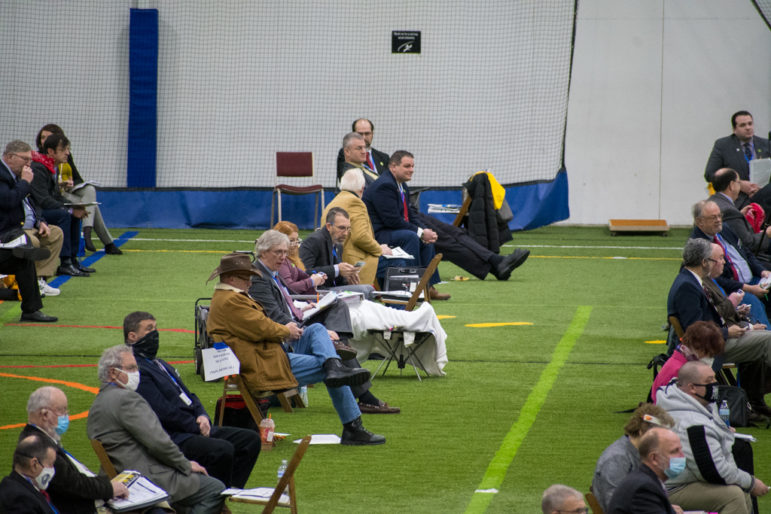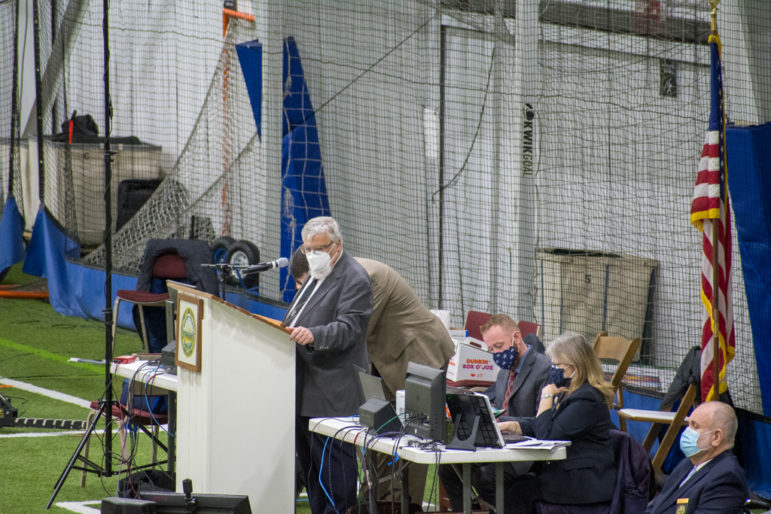
By GARRY RAYNO, InDepthNH.org
BEDFORD — The second day of a contentious House session ended Thursday with an hour-long discussion about two remonstrances – or grievances – submitted to the House.
The day started with House Speaker Sherman Packard, R-Londonderry shaking the hand of House Minority Leader Rep. Renny Cushing, D-Hampton. Packard said the animosity exhibited Wednesday had to stop.
See story here: https://indepthnh.org/2021/02/25/packard-calls-for-end-to-partisan-friction-after-locking-out-democrats/
Before the debate about the citizen’s grievances, the House fought over several education policy bills including doubling down on the current definition of an adequate education that has been in place for over a decade.
They also approved a bill that would allow an armed citizen to use deadly force while in a vehicle instead of just a person’s home and property, and tabled a bill to encourage affordable housing.

Education
The House acted on a series of public education bills that would significantly change current policy.
House Bill 242 defines the content of an adequate education by adding specific kinds of history and science courses for students to take, as well as health and wellness courses, and requiring skills such as computer science, logic, rhetoric and financial literacy.
This is an extremely important bill,” said the prime sponsor Rep. Rick Ladd, R-Haverhill, who chairs the House Education Committee. “Whatever the state says comprises an adequate education, the state must pay for it.”
He emphasized an adequate education has to be the base cost and not include such things as athletics or extra-curricular activities and expanded benefits resulting from collective bargaining agreements.
He contrasted his definition of an adequate education with the Education Funding Commission’s work, which he said aggregated costs and requires spending on items that go beyond what should constitute an adequate education.
The commission looked at average student outcomes across the state and deemed the average to be an adequate education instead of specific resources and said every district ought to receive the necessary funding to provide its students an opportunity to achieve the average outcome.
The proposal did not raise any more money for education than is spent currently, but redistributed it to help property-poor districts with high poverty levels.
The commission assumed average outcomes would be adequate because the state always is among the top in the country.
“They moved beyond the state’s responsibility,” he said, noting if districts want to provide more than an adequate education they have to pay for that themselves.
He said his bill also provides accountability as poorly performing districts would have to post that information on their website and notify parents in writing. “Funding is not the only answer to an adequate education,” Ladd said.
“We need to define an adequate education and not default to local school districts,” he said, “or we will have unsustainable budgets in the future.”
Ladd was a member of the commission but did not support the final report.
The chair of the commission Rep. David Luneau, D-Hopkinton, objected to the bill saying it does not address the problem with the state’s education system.
He said the state is among the best in the country for student outcomes, but it just does not happen in every district in the state.
Students in districts with low property value per pupil and with higher poverty levels do not perform as well as students in districts with greater per pupil property values.
“Many districts are unable to provide their students with an opportunity for an adequate educational outcome and have higher property taxes,” Luneau said.
He said a good example is Manchester where the students are in the bottom fifth percentile and the city lacks the fiscal capacity that would provide their students the opportunity for success.
Other communities with similar problems are Berlin, Pittsfield, Newport and Claremont, he said.
Luneau said the bill also blows a huge hole in local control by allowing private third parties to issue graduation credits instead of letting local districts decide.
“Defining an adequate education in student outcomes is the best way forward,” Luneau said. “This bill just doesn’t do it and takes us in the wrong direction.”
The bill was approved on a 198-149 vote. The bill now goes to the Senate.
House Bill 609 would allow “innovation schools” within traditional public schools able to bypass current regulations and rules.
Supporters said all stakeholders would need to agree to the plan, would allow greater creativity among staff and administrators and would provide students with greater opportunities.
“You would just need a few regulations waived,” said Rep. Alicia Lekas, R-Hudson. “This will empower traditional public schools to do the innovation they would like to do.”
But opponents said it is an attempt to dismantle public education and not enhance it.
Rep. Stephen Woodcock, D-Concord, said the bill is an attempt to create a charter school inside a traditional school building which creates all kinds of problems like how to handle a collective bargaining agreement if teachers in one area are paid differently than the other.
“As a former teacher and administrator, I’ve seen innovation in every school,” Woodcock said. “This is not a step to improve education, it is instead another attempt to dismantle it.”
The bill was approved on a 192-156 vote.
House Bill 349 would change the certification requirements for school nurses.
Current requirements were developed by the NH Nurses’ and the NH School Nurses’ associations to provide consistency; competent, and quality care for school children; and the safety, health, and wellbeing of students, parents, teachers and staff, said Rep. Linda Tanner, D-Sunapee.
But supporters said a registered nurse is a registered nurse no matter what his or her education or training.
Many school districts are renaming the school nurse position to get around the requirements said Rep. Ralph Boehm, R-Litchfield.
“This bill will allow school districts and the Department of Education to develop their own criteria,” he said.
The bill was approved on a 201-146 vote.
The House also approved:
House Bill 110, which has the state send education aid to the city or town and not the school district.
Opponents said it is unnecessary and will create more paperwork and inefficiency for school districts, but supporters said some school districts kept the money intended to help reduce property taxes the last two years instead of turning it over to the city or town to reduce property taxes.
The bill was approved on a 190-152 vote.
House Bill HB 194, which would have the assessment testing company release its information and data directly to a student’s parents.
Currently the local school distributes the data to parents, and supporters said some are very slow to release the information.
The bill was approved on a 193-152 vote,
House Bill 320 would require a student to pass the naturalization test given to those seeking to become American citizens in order to graduate from high school.
Supporters said the bill finally lives up to the long-time promise of a civic education so students will know how government works, but opponents said it would subject students to a high stakes test in order to graduate.
The bill was approved on a 208-140 vote.
House Bill 513, which would approve the degree granting authority of the private Signum University under the authority of the higher education commission.
Opponents argued the school refused to abide by the federal higher education regulations and requirements and should not be granting diplomas.
The bill was approved on a 190-155 vote.
Stand Your Ground
The House approved House Bill 197, which allows someone to use deadly force when inside a vehicle to protect himself or herself and others.
Supporters say the state currently permits a person to use deadly force to protect themselves and their family inside their dwelling and this bill simply expands that permission to a vehicle.
“This bill extends that common sense protection to an individual defending their family and others in a vehicle,” said Rep. John Burt, R-Goffstown.
But opponents said the bill is an extremely dangerous expansion of the stand-your-ground law.
Rep. Ray Newman, D-Nashua, said the bill depends on someone in a vehicle discerning a felony crime from a lower level crime and could result in unsuspecting people being charged with murder.
The bill passed on a 206-144 vote.
The House voted 225-126 to kill House Bill 564, which would prohibit law enforcement from using rubber bullets or tear gas.
The bill was introduced in reaction to police action in some locations last summer during Black Lives Matter protests when police fired rubber bullets indiscriminately into crowds of protesters.
But opponents said the state’s current laws would not allow the same action from law enforcement.
The House also killed House Bill 365 which would allow federal law enforcement to be considered peace officers able to enforce state laws.
Supporters said there is no reason to grant federal officers such powers, voting 260-89 to kill the bill.
The House tabled House Bill 81, which would let you defend anyone in your home with deadly force, not just your family.
The vote was 331-17.
Affordable Housing
The House tabled House Bill 586, a bill aimed at expanding affordable or workforce housing by streamlining the appeal process for developments, providing training for municipal planning and zoning boards and increasing tax credits.
The bill was tabled on a vote of 175-172, and has the support of Gov. Chris Sununu. An attempt to take the bill off the table at the end of the session, failed on a 175-164 vote.
“This bill originally came out of a recommendation from the Governor’s affordable housing task force,” said Rep. Marjorie Porter, D-Hillsborough.
“Our constituents across the state were already struggling to find affordable housing, and the economic shockwaves caused by the pandemic have only intensified this problem. It is extremely disappointing that House Republicans would buck the governor, their own caucus members, and most importantly their constituents to sideline this bill.”
Grievances
The House spent the last hour of its session arguing over what to do with two remonstrances or “address of grievances” submitted to the General Court earlier this year.
Rep. Raymond Howard, R-Alton, sought to have the grievances sent to House committees to be reviewed, but both motions were tabled.
Other attempts were made to have the grievances printed in the next calendar, but that would require an additional 64 pages the House was told and that was voted down.
Then a request was made to have the grievances put on the legislative website with a link in the next calendar, but eventually that was also tabled.
The House did not finish work on 17 bills that will be taken up at the next session.
The bills do not need to go to a second committee for more review before a final House vote. Those bills were all acted on Wednesday.
Garry Rayno may be reached at garry.rayno@yshoo.com.





